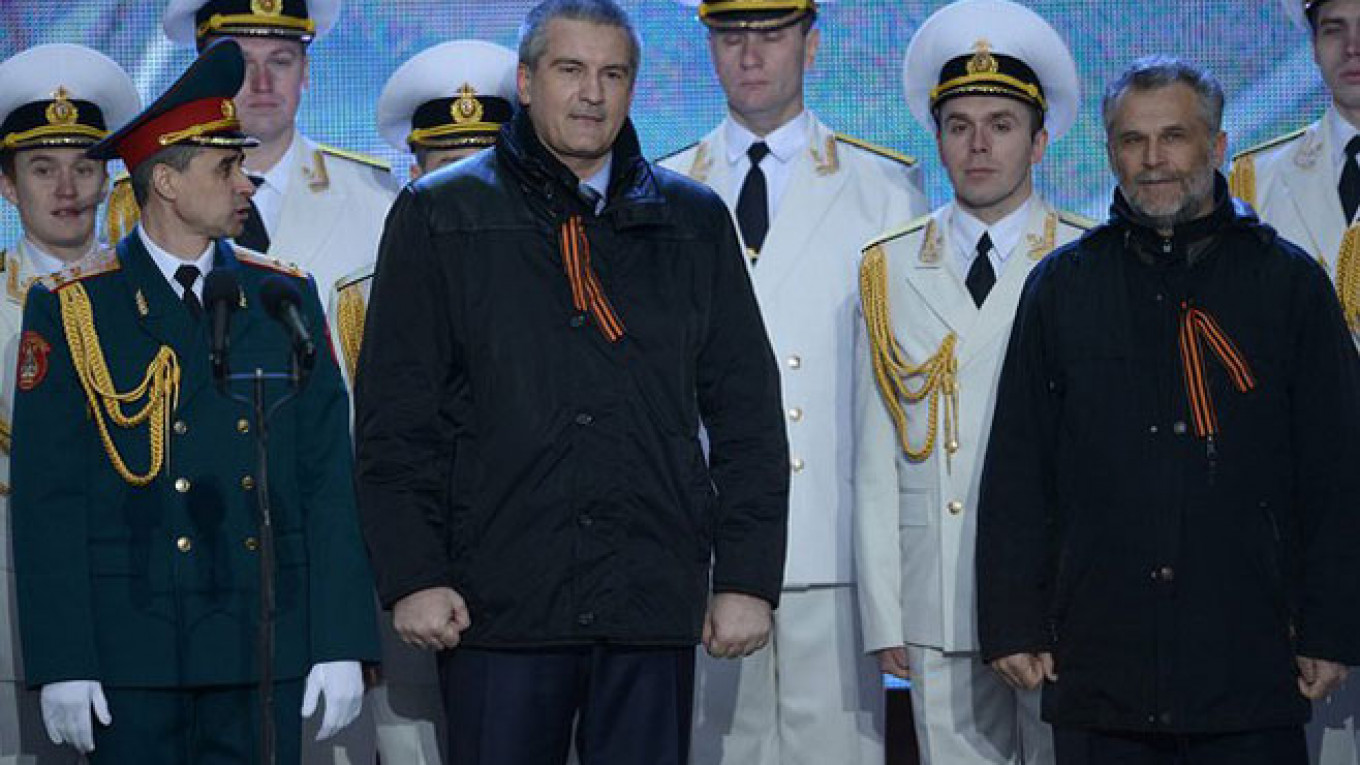Among the many thorny issues facing Crimea's residents following Russia's annexation of the region this week is whether or not to become citizens of their new country.
Residents of Crimea and the Black Sea port of Sevastopol, who voted overwhelmingly on Sunday in favor of seceding from Ukraine and joining Russia, will have a month to choose between Russian and Ukrainian citizenships starting Thursday.
Ukrainian nationals and stateless persons permanently living in Crimea and Sevastopol will be considered Russian nationals after the treaty on Russia's annexation of the territories takes effect Thursday after its ratification in the Russian parliament, the Kremlin said in a statement.
To turn down Russian citizenship, local residents will have to officially apply to authorities within a month after the treaty comes into force. Local residents will apparently not be able to keep dual citizenship since the Ukrainian government does not recognize it, although the Russian constitution does.
Under Ukrainian law, dual citizenship is an administrative offense punishable by a fine of up to 1,700 hryvnas ($170), which effectively means that Crimeans who accept Russian citizenship will face financial penalties unless they hand in their Ukrainian passports.
In February, following the ouster of pro-Russia President Viktor Yanukovych, a group of lawmakers submitted a bill to the Ukrainian parliament that would make dual citizenship a criminal offense with a similar fine for ordinary citizens, and introduce prison terms of up to 10 years for state officials holding two passports.
Ukrainian Justice Minister Pavel Petrenko, speaking late Tuesday, called on Crimean residents not to hand in their Ukrainian passports. "You are Ukrainian citizens and have actually been taken hostage by invaders," Petrenko said on Ukrainian television.
But Sevastopol Mayor Alexei Chaly said Wednesday that the issuance of passports was "of secondary importance" in the annexed territories. He said the issues of pensions and salaries to civil servants would be prioritized, as well as securing energy and water supplies given that Kiev may halt financing of the region and cut off supplies of utilities following the referendum to split from Ukraine.
It remained unclear Wednesday what the legal status of local residents who want to keep their Ukrainian passports will be or whether they will have to leave the region. A spokesman at the Russian Foreign Ministry redirected the inquiry to the Federal Migration Service, where a spokeswoman said she had no information on the subject yet.
Crimean Prime Minister Sergei Aksyonov said last week that although regional authorities would not oblige Crimean residents to hand in their Ukrainian passports, "everybody will have to obtain Russian passports anyway," he said. Those who refuse Russian citizenship will not be eligible for Russian pensions, salaries and social benefits, Aksyonov said a few days later.
But Ukrainian First Deputy Prime Minister Vitaly Yarema said Monday that Crimean residents who keep their Ukrainian passports would be entitled to Ukrainian government pensions and salaries, while Ukrainian servicemen in Crimea would remain in their bases.
Moscow-based political analyst Alexander Kynev predicted that 15 to 20 percent of the almost 2 million residents of Crimea may refuse Russian citizenship, and that authorities would not be able to deport them, which would make them similar to non-citizens in Latvia, Kommersant reported Monday.
Contact the author at n.krainova@imedia.ru
A Message from The Moscow Times:
Dear readers,
We are facing unprecedented challenges. Russia's Prosecutor General's Office has designated The Moscow Times as an "undesirable" organization, criminalizing our work and putting our staff at risk of prosecution. This follows our earlier unjust labeling as a "foreign agent."
These actions are direct attempts to silence independent journalism in Russia. The authorities claim our work "discredits the decisions of the Russian leadership." We see things differently: we strive to provide accurate, unbiased reporting on Russia.
We, the journalists of The Moscow Times, refuse to be silenced. But to continue our work, we need your help.
Your support, no matter how small, makes a world of difference. If you can, please support us monthly starting from just $2. It's quick to set up, and every contribution makes a significant impact.
By supporting The Moscow Times, you're defending open, independent journalism in the face of repression. Thank you for standing with us.
Remind me later.






